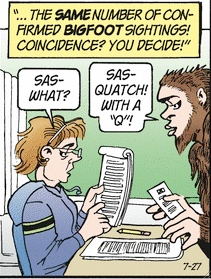Maine Sasquatch Shows Up In Doonesbury
Posted by: Loren Coleman on July 28th, 2012
The Portland Press Herald for Saturday, July 28, 2012, had a weirdly headlined article on Page One, to greet my morning:
‘Doonesbury’ mocks Maine GOP chairman
Okay, I said to myself, I’ll read this to see what Doonesbury has to say about Maine politics. You can imagine my surprise when I found Sasquatch in the story.
Here is the section of the article that specifically deals with our area of interest here:

The strip begins with Jimmy Crow saying: “Here in Maine, folks love to vote! They’re tops in turn-out!”
In the second frame, Crow says: “Sadly, too many of them (voters) are Democrats, who like to ‘steal’ elections, according to GOP chair Charlie Webster.” Below the text are anonymous figures representing the elderly, disabled people and college students, groups that could be disenfranchised by voter ID laws, according to critics.
The comic then mocks claims by Webster and other Republicans who argue that voter ID laws are designed to prevent voter fraud. It mentions that Maine has had just two convictions for voter fraud over the last 38 years.
The convictions, the strip says, is the “same number of confirmed Bigfoot sightings! Coincidence? You decide!”

Considering Michelle Souliere and I are coauthoring a book entitled Bigfoot in Maine, I immediately wondered if Doonesbury’s creator/author Garry Trudeau knows something we don’t know. Our count is way above “two.” 🙂

About Loren Coleman
Loren Coleman is one of the world’s leading cryptozoologists, some say “the” leading living cryptozoologist. Certainly, he is acknowledged as the current living American researcher and writer who has most popularized cryptozoology in the late 20th and early 21st centuries.
Starting his fieldwork and investigations in 1960, after traveling and trekking extensively in pursuit of cryptozoological mysteries, Coleman began writing to share his experiences in 1969. An honorary member of Ivan T. Sanderson’s Society for the Investigation of the Unexplained in the 1970s, Coleman has been bestowed with similar honorary memberships of the North Idaho College Cryptozoology Club in 1983, and in subsequent years, that of the British Columbia Scientific Cryptozoology Club, CryptoSafari International, and other international organizations. He was also a Life Member and Benefactor of the International Society of Cryptozoology (now-defunct).
Loren Coleman’s daily blog, as a member of the Cryptomundo Team, served as an ongoing avenue of communication for the ever-growing body of cryptozoo news from 2005 through 2013. He returned as an infrequent contributor beginning Halloween week of 2015.
Coleman is the founder in 2003, and current director of the International Cryptozoology Museum in Portland, Maine.










I hope that Garry Trudeau will donate the original artwork to the ICM.
Nope, Garry knows nothing you don’t know.
On this topic he knows a lot less.
On the frontiers of science, those perceived as most knowledgeable by the public at large are in fact the most ignorant. But then that’s why it’s the frontiers of science.
Doonesbury’s Loch Ness strips from 25 years or so back were pretty funny.
Trudeau is a tool.
Honestly, I wonder where you get these things.
I would not say that just because someone is a popularizer of science he must be an outstanding scientist, but I wouldn’t say it proves him to be “the most ignorant”, either. Einstein was “perceived as the most knowledgeable by the public” but was certainly not “the most ignorant” — not even about quantum mechanics, with which he had a philosophical disagreement. Likewise with Darwin and many more.
I think the real problem here may be with your definition of “the frontiers of science”. It clearly means something different from what I would mean by it, which would include all science that has not been done before, whether it’s “sexy” or not. The frontier is, under this definition, REALLY REALLY BIG. There’s plenty of room for every actual or potential scientist, since each answer tends to lead to even more questions.
Fhqwhgads:
“Honestly, I wonder where you get these things.”
Oh, thinking. Somebody’s gotta.
Or do you just go with the general public’s perception of who is most knowledgeable?
If you do, why not just let them do the science? They know best, right?
The general public’s perception is that the folks Max Planck says we need to get out of the way (“science advances one funeral at a time”) are the ones to listen to.
If they’re even that knowledgeable.
Real thinking tends not to end up with cartoonish answers. It tends to end up in a lot of hedged statements and a repetition of “it depends”. Real thinking does not lead to statements like, “On the frontiers of science, those perceived as most knowledgeable by the public at large are in fact the most ignorant.”
Take, for example, global warming. Most of the public, I’ll grant you, got their information from those two great scientific masters, Al Gore (who said it’s real) and Rush Limbaugh (who said it isn’t real). In an example like that, what you say is true, and the public is getting their info from people who don’t really know what they’re talking about. That tends to be the case whenever people are emotionally (or financially) invested in the outcome of the science.
But that’s a long way from claiming that because Jack Horner is often interviewed for his views on palaeontology, he must be “the most ignorant” about palaeontology. True, he may be asked questions that are outside his speciality — for instance, about the evolution of bird from dinosaurs — but even on general questions of palaeontology he will know much more than the public, or you or I. The same is true of Stephen Hawking: he knows as much as anybody about black holes, could give a well-informed comment on the Higgs boson, but he’s no specialist there; and when it comes to questions like the existence of God, he knows no more than the typical college graduate (which is to say, not much).
Unfortunately, you seem to be dangerously close to saying, “Jeff Meldrum tells me what I want to hear about Bigfoot, so he’s an expert. Anyone who doesn’t say what I want to hear is at least ignorant and probably an idiot.” Obviously, such an attitude is no reliable guide to the truth, but it is also counterproductive.
Fhqwhgads:
The history of science showing – as, actually, you just did – that I’m completely right, this is a bone that really doesn’t need worrying.
And I point to your key sentence, or snippet of same:
“But that’s a long way from claiming that because Jack Horner is often interviewed for his views on palaeontology, he must be “the most ignorant” about palaeontology. True, he may be asked questions that are outside his speciality …”
Exactly.
When an ‘expert’ is asked questions about something he knows nothing about, and his ‘answers’ – I am being nice, and considering “Why hasn’t anyone shot one?” an ‘answer’ – show any enlightened layman that he very clearly has not considered the evidence, he is as ignorant as one can be, on the topic specifically addressed by the evidence. Which isn’t “primatology,” or “paleontology,” but “the existence of an animal you could address with that sheepskin, but choose not to.”
THAT is what I am talking about, and that ain’t no technicality. That is the vital beating heart of the matter.
Youse ignant, youse ignant, regardless of degree.
Meldrum is my guy – and Bindernagel’s another – for a reason that should shut up any scientist: he has key chops, and with those chops, he directly addresses the evidence. And comes up with conclusions that seem, to anyone rudimentarily acquainted with the use of logic, eminiently logical.
One of which is not: the biggest joke humans have ever played on ourselves is an upright ape. And it is costing an UNGODLY amount of time, money, and technical expertise, probably more than the US space program and D-Day, combined.
Sure. I’ll buy that with no evidence.
(And to deny that’s what the mainstream thinks is to pronounce one’s ignorance of the evidence.)
No. I won’t buy that with no evidence. I am ALL ABOUT the evidence.
Science – way too frequently for my tastes – is not. (And the historians of science nod, in unqualified agreement.) It’s way too often about the things scientists like to comfort themselves with thinking.
Only dog I got in this fight?
The truth.
Oh.
Curiosity. That too. It helps to be, you know, curious about your world.
There seem to be some incomplete thoughts in your last response. This happens to me all the time, because my comments tend to get interrupted by more pressing matters, and I *think* that I have made my point when in fact I was only setting up my argument, or I *think* I have finished a sentence when in fact it’s still just a fragment.
At any rate, I still disagree with the idea that because someone is not a specialist in an area, he is totally ignorant of it. If that is the case, what’s your point in being on this blog? You’re not a specialist in hominid biology; does that make you worthlessly ignorant?
Of course not. Much of your ability to reason on topics like cryptozoology comes from your general education. Well, anyone who earns a Ph.D. has to become an expert in one specific aspect of his field, but he will have a solid background in the broader aspects of the field. In fact, in many cases a significant part of the Ph.D.’s job will depend as much on the broader background knowledge as on the speciality. This is certainly the case with university professors; for example, my speciality is computational statistical mechanics, but I have taught just about every physics course except Intro Modern Physics and Electronics. The same is true of museum staff; their duties will include a substantial amount of educational outreach. Likewise, the specific duties of industrial scientists may take them far from their thesis research.
So yes, that means that the professional opinions of trained zoologists should not be casually dismissed.
And that’s not including those scientists who actually do field work in the exact areas where Bigfoot is most often reported. For example, there is (surprise! surprise!) a strong overlap between the area where Bigfoot is most often reported and the range of grizzly bears in the lower 48 states. Grizzlies have undoubtedly been mistaken for Bigfoot at times; after all, there have been things that were pretty clearly tree trunks that were mistaken for Bigfoot in photos that have been analysed on this site. The assumed food of Bigfoot and grizzlies is also much the same. Heck, for that matter the American Indian legend of the origin of the Indians from bipedal, tool-using, talking grizzlies would probably be taken as folk evidence for the existence of Bigfoot. So it makes sense that a biologist looking for grizzlies in the field might well come across and document Bigfoot, assuming that the Bigfoot population is not too much smaller than the estimated grizzly population of 1000 to 1200; if the Bigfoot population is much smaller than that, serious concerns about the sustainability of the breeding population are justified. Oh, if only there were attempts to scientifically survey grizzlies! Which, of course, there are.
My point is, essentially, this.
One can tell – from one’s general education – that anyone pronouncing negatively on the existence of the sasquatch is pronouncing without considering the evidence, if one has but read up on the evidence.
Which invalidates scientific credentials as a factor.
If a new moon appears in the sky, next to the current one, we all can see it, but ‘experts’ in astronomy simply refuse to address the issue, intelligent people don’t just defer to their (lack of ) opinion. They want to know what the object is.
Well, when a pile of evidence that to all appearances is legitimate is sitting right there; a couple of scientists with credentials that appear to scan very well have reviewed it, and pronounced it genuine; others have said, this is definitely worth a serious look…but the mainstream says, what evidence?
…the mainstream’s credentials aren’t the issue.
Their willingness to use them for something?
That is.
Your sasquatch/grizzly example doesn’t make a ripple to anyone in command of the evidence. In short: bears aren’t being mistaken for apes. That not only is clearly contradicted by eyewitness testimony, but clearly not what psychology says happens.
Psychology says: you mistake a sasquatch for the moose you just wounded.
As one very detailed report of the killing of one makes clear DOES happen.
You plug in knowns to explain unknowns. Not the reverse. That’s just what humans do.
Oh, forgot.
What about the grizzly researcher who saw a sasquatch on his rounds? What happened to his report?
Right. That’s what does.
What about this guy’s experience in the summer of 1972?
(I’ve met him. This isn’t dismissible.)
The latter actually happened. The former? Only probably. And very probably more than a couple times. Not that we’ll ever hear about it. (Other than the few – anonymous – reports I’ve read from wildlife biologists.)
When nobody believes anyone who saw one, no one believes any professional biologist who says he did, either.
And I have to get in my final word before I leave for two weeks in Maine.
(Loren: Hope I have time for the Museum.)
Individual accounts aren’t proof. But when you pay attention, you see there are commonalites that aren’t explainable by any means that skeptics have proposed.
It’s long past time for science to adopt an open mind on this, and tell scientists: there is NOTHING you see out there that the world isn’t interested in. REPORT IT. We’ll take it seriously.
Note that link I put up there. Mr. Mionczynski is far from the only one who has, privately or publicly, been threatened by “scientific” colleagues for following his curiosity the way science expects all true scientists to do. “Not dismissible” means “you can’t say this is crap,” for the same reason that’s already been pointed out:
“,,, the professional opinions of trained zoologists [or, you know, wildlife biologists] should not be casually dismissed.”
At least when they pay attention, they shouldn’t.
See you in two weeks.
Have a good time in Maine!
I think you are on much more solid ground with some of your comments, but that’s because you are being careful and retreating from a rash generalization.
Thanks for the link, by the way. I’m not sure if this is the case you were referring to. But my point is that *if* Bigfoot is real, this kind of thing should happen from time to time, and that the periodic wildlife surveys conducted by various agencies and groups are probably more likely to stumble into solid evidence than Destination Truth, Finding Bigfoot, or the weekend enthusiast.
The example of an extra moon is interesting. I have often seen extra moons in the sky — often enough that when it happens, I know I am dreaming. In my dreams the explanation is that the refraction that makes stars twinkle is working in overdrive. Sometimes it just makes the moon look 5 times larger instead. But of course to use your analogy, the problem is that with someone claiming that there is an extra moon in the sky vs. other people who do not see it when they look or those who point out that if there were a 2nd moon they should have seen it approaching the previous evening (something strangely absent in movies like Independence Day and Deep Impact), or that it should be gravitationally distorting the orbits of communications satellites; it’s more likely you saw a moondog. (I’ve seen those while waking.)
Fhqwhgads:
Maine was cool. And I didn’t make time for the Museum. But Maine being Maine, I never do all I want to.
I’d certainly agree with you that TV shows driven by ratings have a prima facie reason to plow ahead with what titillates viewers, and have less chance of uncovering something than the periodic wildlife surveyors who, remember, have to deal with an establishment whose starting point for unknown animals is that-doesn’t-exist-so-don’t-report-one.
(That’s being worked on now for, say, cougars and wolves expanding range. But we aren’t there for apes yet, even though the Bureau of Land Management and the Army Corps and Skamania County, WA have actually made rudimentary efforts to move the needle.)
The scientific consideration of evidence hasn’t been truly tapped, in my opinion, for its viewer value. But it sure would make the shows more interesting to me. Right now, there’s no reason I can come up with to watch one of them. I truly believe that I read far more than I need to know about them right here on Cryptomundo. And weekend enthusiasts not only bring too many perspectives to this issue (and fight each other too much, over too little), but they simply don’t devote the required time. It would be tough to find a fox den in my neighborhood in a weekend, and I know they’re there.
My extra-moon example was simply to point out that people are experts only in their area of expertise. When something outside that area crops up, their expertise is dangerous to trust, because now we’re veering into argument-from-authority territory, to wit: I say this isn’t real because I’m a primate expert, and it isn’t. When evidence becomes available that one has not considered yet, one is in over one’s depth when one pronounces without considering it. The mainstream attacks against such as Jeff Meldrum show very clearly that the evidence isn’t under consideration, just people’s feelings about it, which come from not having reviewed it and thought about it, Eugenie Scott. (Just sayin’.)